Is Two Good Yogurt Healthy (From a Nutritionist)?
In this blog post, I’ll review whether Two Good Yogurt is healthy or not? Find out this product’s nutrition pros and cons, plus some better options to consider. In my opinion as a nutritionist, Two Good Yogurt is a decent choice, but there are less processed options available to consider. Let’s discuss!
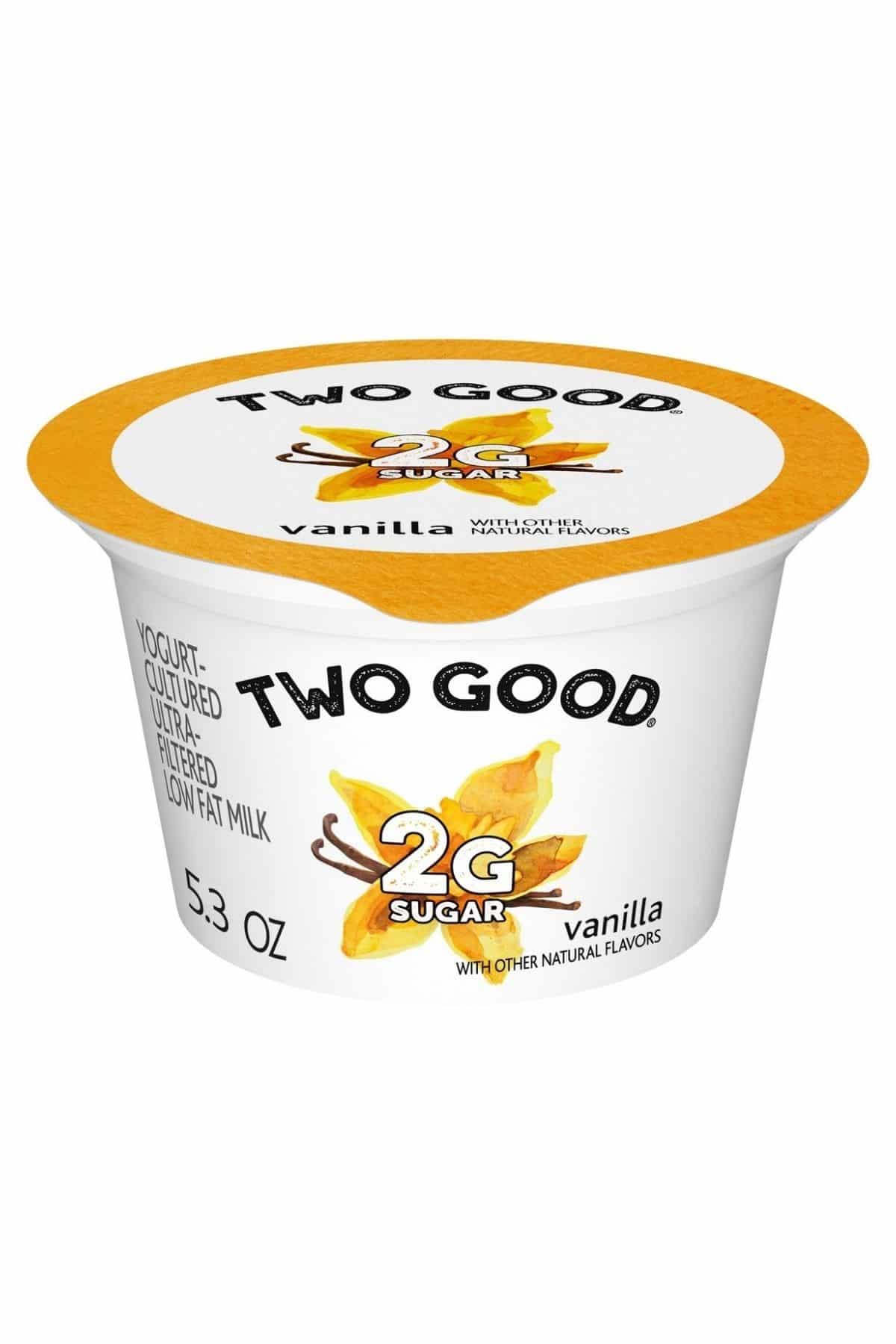
Two Good Yogurt Facts
The Dannon Yogurt Company makes Two Good Yogurt as part of their efforts to give clients healthier, more environmentally friendly options.
Dannon, known as Danone North America outside of the US, is a certified B corporation, a group of companies verified to use their business for good. They meet the highest standards of social and environmental criteria.
The Two Good Yogurt brand is made for “health-conscious and environmentally aware people.” It’s available in the refrigerator aisle or yogurt aisle of your local grocery store.
The company states that its products contain as much as 80% less sugar than average yogurt and produces various yogurts and smoothies.
The yogurt is available in the following flavors:
- Strawberry
- Blueberry
- Vanilla flavor
- Raspberry
- Peach
- Coconut
- Mixed Berry
- Strawberry Banana
- Black Cherry
Two Good Yogurt has two flavors in the GOOD SAVE® range, made from rescued fruits and veggies to help reduce food waste. The flavors are Meyer Lemon and Pumpkin.
Two Good Yogurt Ingredients
Two Good Yogurt typically contains cultured ultra-filtered non-fat milk, cultured regular low-fat milk, water, fruit puree, tapioca starch, natural flavors gellan gum, fruit and vegetable juice concentrate, sea salt, active cultures L. bulgaricus & S. thermophilus, and vitamin D3.
Some flavors contain other ingredients, including vanilla seed specks, cinnamon, lemon juice concentrate, pectin, and locust bean gum.
Specifically, for the Vanilla flavor, the ingredient list includes:
- Cultured Ultra-Filtered Lowfat Milk
- Water
- Chicory Root Fiber
- Natural Flavors
- Lemon Juice Concentrate
- Gellan Gum
- Stevia Leaf Reb M
- Live Active Cultures (S. Thermophilus, L. Bulgaricus, L. Acidophilus, Bifidus, L. Casei, L. Rhamnosus)
Here’s more information on some of the main ingredients in Two Good Yogurt so you can help decide if it’s a healthy snack or not.
Gellan gum
Gellan gum is a common food additive made from bacteria. It is a thickener that creates stable gels, allows liquids to become suspended, and enhances texture.
Since it’s 100% plant-based, gellan gum is a common ingredient in processed vegan and vegetarian foods like almond milk, fruit juices, vegan gummy sweets, and condiments.
Although gellan gum is officially classified as a safe ingredient, it’s important to note that it can cause digestive discomfort like gas and bloating in some people, especially those with a history of gastrointestinal problems.
Stevia leaf (Reb M And D)
Stevia leaf is a natural sweetener that is virtually calorie-free and significantly sweeter than regular sugar.
It has some health benefits, like reducing cholesterol, and research has shown that it may help fight cancer. Reb M and D are the sweetest versions of stevia compared to Reb A, the traditional type.
It is worth noting that recent research has shown that although stevia is a natural sweetener, it could have side effects, including digestive distress in people sensitive to sugar alcohols as well as unhealthy changes in the gut microbiome, even when you consume it in low quantities.
I personally cannot consume stevia and know that it’s not a great option for me. But, other people might have no problem with consuming stevia.
Ultra-filtered non-fat milk
Ultra-filtered milk is dairy milk that has undergone a specialized filtration process to concentrate protein and nutrient content while removing some of the natural sugars (lactose) and water.
The process involves filtering the milk through a fine membrane, after which it undergoes additional processing to remove its fat.
The result is milk with a higher protein content, less lactose, and no fat.
Fruit puree
Fruit puree is made with fresh fruit, so it contains the fruit’s nutrients. However, it is processed, which may affect the nutrient content negatively.
The company’s website does not state whether the fruit puree used is additive and preservative-free or if it contains any added sugars or artificial sweeteners.
L. Bulgaricus and S. thermophilus
These active yogurt cultures are two of the most common bacterial strains manufacturers use to ferment yogurt and other dairy products.
They are probiotics that offer various health benefits. They can aid digestion by producing enzymes that help break down lactose and contribute to gut health by promoting a balanced microbial environment.
Although L. bulgaricus and S. thermophilus can be part of a healthy diet, they can cause health problems for people with certain medical conditions or compromised immune systems. If you’re unsure, talk to a medical professional before you add this product to your diet.
Other ingredients
Other ingredients in a two good cup include vitamin D, tapioca starch, sea salt, and vegetable coloring.
Nutrition Pros
Two Good yogurt contains significantly less sugar than most sweetened yogurt brands.
There are no added sugars – the 2 grams of sugar in the product comes from naturally occurring sugars in milk and the fruit puree added to the yogurt. It is also certified gluten-free.
Competing brands of an average greek yogurt in a 5 oz cup will contain about 10 grams of total sugar.
Since it contains probiotics, this yogurt could help promote gut health and help the body digest lactose, which can cause digestive problems in some people.
Each serving of this type of yogurt contains about 10 grams of protein 4 g carbs, and 2 g fat.
It can be a great way for kids or people on the go to get protein in the morning or as a snack. Protein intake in the morning has been linked with more successful weight loss and increase satiety.
Two Good Yogurt has a range called GOOD SAVE®. The range is made from “rescued” fruits and veggies, which means the company is actively involved in reducing waste and surplus produce using food rescue organizations.
Nutrition Cons
The ingredients in Two Good Yogurt are not organic, although they are part of the non-gmo project.
Although some of the milk in this product is ultra-filtered, which can help remove the lactose in it, it is still unsuitable for people who are allergic or sensitive to dairy. It is also low-fat or non-fat, which some nutrition experts may argue is a processed food.
Another con is that the manufacturer packages all the products in plastic. The company may be a B Corp ™ company and meet high social and environmental criteria standards, but the packaging is still plastic and requires recycling.
Nutrition FAQs
Two Good Yogurt contains zero added sugars, has a high protein content, and is made using regular reduced-fat and ultra-filtered non-fat milk. The manufacturer makes it using a different process from regular yogurt brands.
The process used to make the ultra-filtered milk in Two Good Yogurt lowers the product’s natural milk sugar content while increasing the protein content. The sweetness in Two Good Yogurt comes from the remaining milk sugars, fruit puree, and added stevia. There is no added sugar.
No, Two Good yogurt contains dairy, which contains lactose.
If you have diabetes, please speak to a medical professional before eating this product or any other product that contains sugar, whether it’s natural or added.
No, Two Good Yogurt does not contain any artificial sweeteners. However, it contains stevia, which is a sugar alcohol and can cause digestive distress and other health problems.
Don’t Miss These Product Reviews!
Conclusions
Two Good Yogurt is slightly healthier than regular high-sugar yogurts, but it’s still a processed product and not the best option for optimal health. It contains processed ingredients, is not organic, and is manufactured and sold in plastic containers. It is not a suitable product for vegans, people who follow a plant-based diet, or those sensitive or allergic to dairy or sugar alcohols.
If you choose to eat this product, do so in moderation. You could also purchase plain Greek yogurt and add your own fruit to sweeten.
Don’t forget to join my newsletter list to get exclusive clean eating recipes and tips. The newsletter is 100% free with no spam; unsubscribe anytime.
About the Author: Carrie Forrest has a master’s degree in public health with a specialty in nutrition and is a certified holistic nutritionist. She is a top wellness and food blogger with over 5 million annual visitors to her site. Carrie has an incredible story of recovery from chronic illness and is passionate about helping other women transform their health. Send her a message through her contact form.
Note: this post is for informational purposes only and is not intended as medical advice. Please consult your healthcare provider for recommendations related to your individual situation.


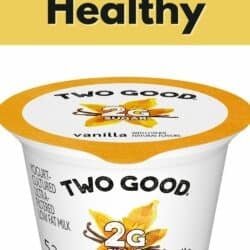

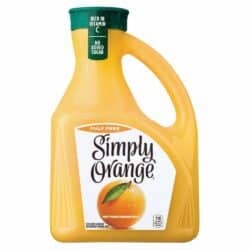
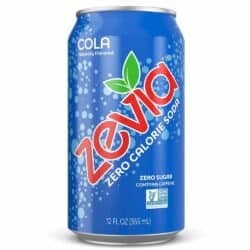



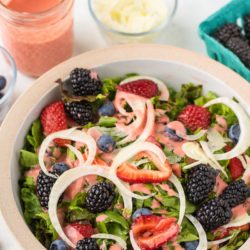


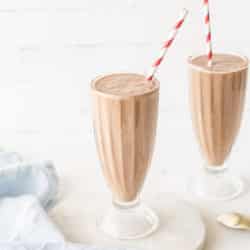








I thought it had an artificial sweetener taste, but that may be the stevia.
Yes, absolutely!
Good article on Two Good yogurt. Thank you.